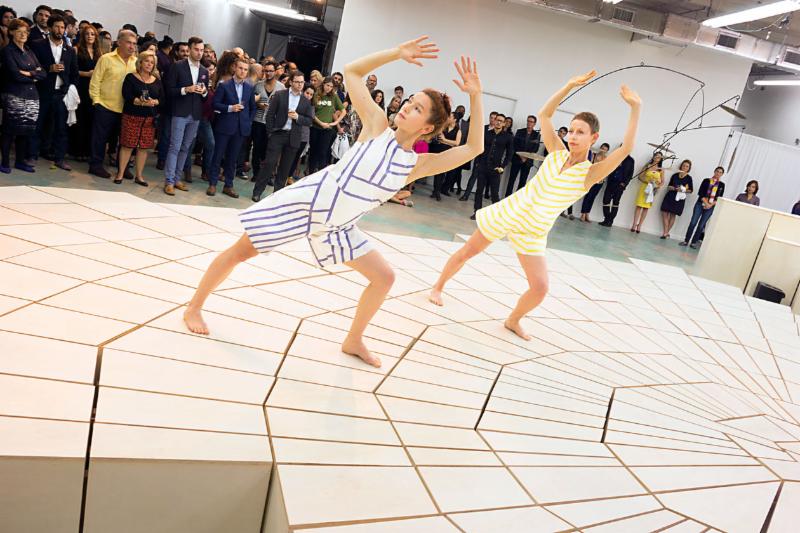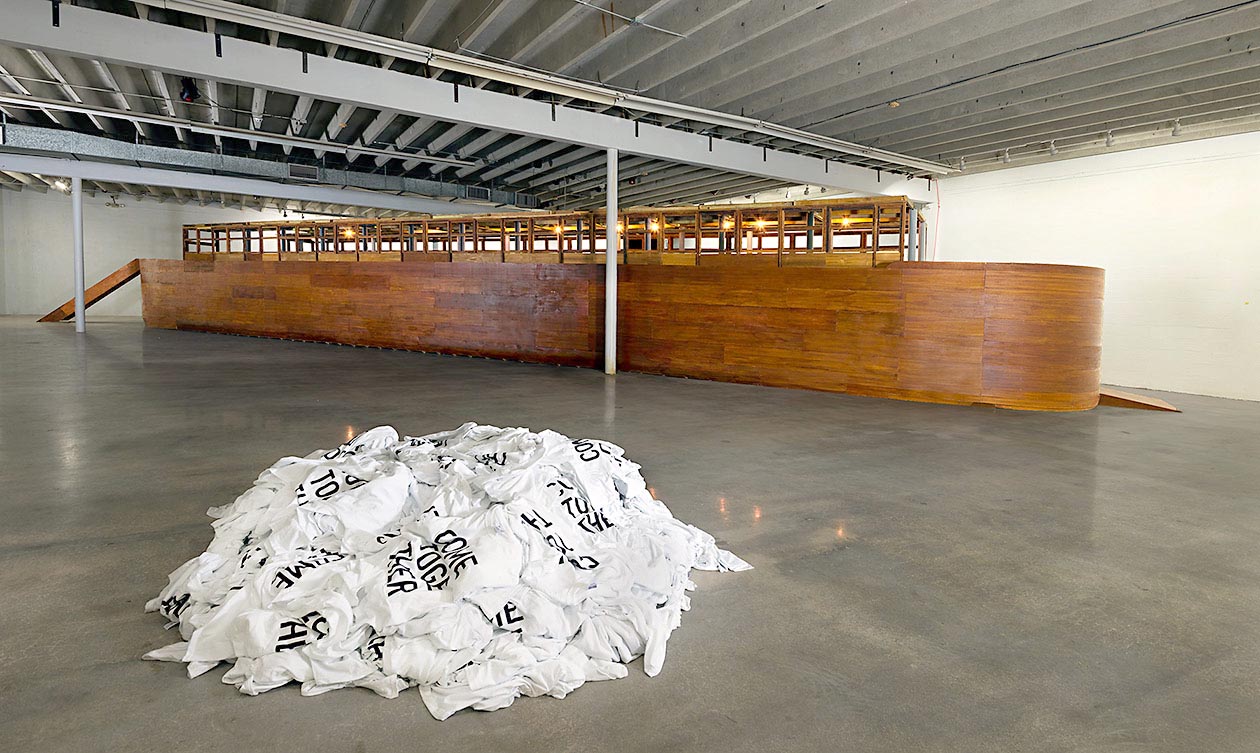Carlos Amorales
SPIDER GALAXY

Spider Galaxy incorporates a seating platform, inviting audience participation and repositioning the sculpture as a performance space. Artist Galia Eibenschutz will choreograph a new work for the Miami installation. She previously presented site-specific performances on Spider Galaxy at Performa 07 in New York and the Museo Tamayo in Mexico City.
ABOUT CARLOS AMORALES
Carlos Amorales was born in 1970 in Mexico City, where he currently lives and works. Between 1992 and 1996 he studied in Amsterdam, at the Gerrit Rietveld Academie and the Rijksakademie. Amorales came to international attention in the late 1990s with his “Amorales vs. Amorales” performances, which were inspired by the world of amateur wrestling in Mexico. Much of the artist’s work explores the culture and values of his native Mexico. He is fascinated with contemporary rituals, both secular and religious, particularly the role and meaning of costume and masks. He continues to explore these motifs in a multifaceted artistic production that includes performance, animation, painting, drawing, and sculpture. Amorales is also interested in collaborative practices and is part of Nuevos Ricos, an artist group that includes musicians, performers, and designers. Amorales has participated in major international group exhibitions such as the 50th Venice Biennale (2003) where he represented the Netherlands, the 2nd Berlin Biennial (2001), and the 1st Tirana Biennial (2001).[/vc_column_text]
Asile Flottant/Spider Galaxy Press Release

CARLOS AMORALES’ SPIDER GALAXY AND RIRKRIT TIRAVANIJA’S ASILE FLOTTANT
ON VIEW DURING ART BASEL MIAMI BEACH
On view December 5, 2013 – January 23, 2014
Opening Reception: Thursday Dec 5, 7-10pm
Performance: December 5th at 8pm: Offerings: Humanity and Modernity by Atma Dance Company
The Center for Visual Communication is pleased to announce an exhibition of major projects by Carlos Amorales and Rirkrit Tiravanija in Wynwood during Art Basel Miami Beach.
Spider Galaxy by Mexican artist Carlos Amorales is a sculptural platform based on Amorales’ liquid archive consisting of 400 individual wooden blocks that fit together in a spider web configuration. In a departure from his well-known work with vectorized iconography such as birds, trees and figures arranged in high contrast formations, the piece relies on geometry and repetition to create a single large-scale form.
Spider Galaxy incorporates a seating platform, inviting audience participation and repositioning the sculpture as a performance space. Artist Galia Eibenschutz will choreograph a new work for the Miami installation. She previously presented site-specific performances on Spider Galaxy at Performa 07 in New York and the Museo Tamayo in Mexico City.
Rirkrit Tiravanija’s Asile Flottant is a half-scale replica of the floating asylum barge that Swiss architect Le Corbusier designed in 1929 for the Salvation Army in Paris. Le Corbusier’s barge, moored on the Seine River, provided temporary overnight shelter for the Parisian underclass, who were otherwise found wandering the streets or sleeping under bridges. Tiravanija’s replica was built in Chiang Mai, one of few Thai cities that monks predict will survive an upcoming deluge. A portion of the barge will be reconstructed in the Center for Visual Communication’s main gallery.
Tarivanija’s Asile Flottant houses a growing collection of political t-shirts, some designed by the artist and others collected from activists around the world. The t-shirts, with slogans invoking social messages, suggest the ease with which the body can be transformed into a politicized space. This will be the first installation of Asile Flottant in the United States.
Miami-based dancers will present public performances engaging Amorales’ and Tiravanija’s works throughout the duration of the exhibition.
Events will be announced via the Center for Visual Communication’s website (www.visual.org).
ABOUT CARLOS AMORALES
Carlos Amorales was born in 1970 in Mexico City, where he currently lives and works. Between 1992 and 1996 he studied in Amsterdam, at the Gerrit Rietveld Academie and the Rijksakademie. Amorales came to international attention in the late 1990s with his “Amorales vs. Amorales” performances, which were inspired by the world of amateur wrestling in Mexico. Much of the artist’s work explores the culture and values of his native Mexico. He is fascinated with contemporary rituals, both secular and religious, particularly the role and meaning of costume and masks. He continues to explore these motifs in a multifaceted artistic production that includes performance, animation, painting, drawing, and sculpture. Amorales is also interested in collaborative practices and is part of Nuevos Ricos, an artist group that includes musicians, performers, and designers. Amorales has participated in major international group exhibitions such as the 50th Venice Biennale (2003) where he represented the Netherlands, the 2nd Berlin Biennial (2001), and the 1st Tirana Biennial (2001).
ABOUT RIRKRIT TIRAVANIJA
Rirkrit Tiravanija was born in 1961 in Buenos Aires, and is widely recognized as one of the most influential artists of his generation. His work defies media-based description, as his practice combines traditional object making, public and private performances, teaching, and other forms of public service and social action. Winner of the 2004 Hugo Boss Prize awarded by the Guggenheim Museum, his exhibition there consisted of a pirate radio (with instructions on how to make one for yourself). Tiravanija was also awarded the Benesse by the Naoshima Contemporary Art Museum in Japan and the Smithsonian American Art Museum’s Lucelia Artist Award. He had a retrospective exhibition at the Museum Boijmans Van Beuningen in Rotterdam, which traveled to in Paris and London. Tiravanija is a founding member and curator of Utopia Station, a collective project of artists, art historians, and curators. Tiravanija is also president of an educational-ecological project known as The Land Foundation, located in Chiang Mai, Thailand, and is part of a collective alternative space located in Bangkok, where he maintains his primary residence and studio.